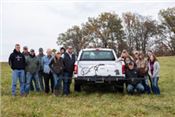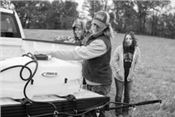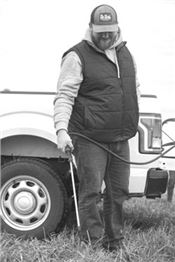|
Southeast Agriculture Students Conduct Herbicide Trials, Research

SEMO-AgHerbicideTrials2: Southeast agriculture students with the upgraded weed management sprayer with new nozzles,
a power unit and calibration, a key component of conducting the herbicide trials.
CAPE GIRARDEAU, MO.
Southeast Missouri State University students with the Department of Agriculture are currently conducting herbicide trials and research as part of plant science research at the David M. Barton Agricultural Research Center.
The trials and research is based on the students’ weed science and soil fertility and plant nutrition courses, said Dr. Michael Aide, a professor in Southeast’s department of agriculture. The students are learning how to address weeds present in pastures and develop a management plan. Additionally, students will develop a soil fertility plan specific to the culture of tall fescue, a common grass species.
As part of the first, major step in their project, the students upgraded a weed management sprayer, a key part of conducting the herbicide trials. The students updated the sprayer with new nozzles, a power unit and calibration.
Using the updated sprayer, the students recently began their first herbicides trials in pastures at the Barton Research Center.
“The students scouted the fields to identify the weeds that are present, and then identified the appropriate herbicides to be sprayed,” Aide said. “The students also identified non-chemical methods for weed management.”
Drew McLane, a senior agribusiness, plant and soil science option from Ware, Illinois, plans to take the knowledge he gains from this project on his own family farm. As part of the trials, he’s learned how to calculate and apply the right amount of glyphosate herbicide at the Barton Center’s pastures.
“The herbicide trails are important to me because I do most of the sprayer applications at my farm and seeing what works and what doesn’t is very important,” said McLane, who has enjoyed the opportunity to apply what he’s learned in the classroom into the field. “I retain much more information by doing hands-on work such as the herbicide trails. I learn more in five minutes of hands-on work than I do from an hour in a classroom.”
Brendan Tremain, a senior agribusiness, plant and soil science option from Bridgeton, Missouri, was in charge of calibrating the sprayer. He participated in scouting the fields and applying the herbicide.
Tremain said, “These trials are important because they are broadening my skills and have advanced my knowledge in the field of agriculture. I enjoy aiding my classmates and teachers in conquering these noxious weeds before they become a prominent issue in our pasture fields.”
Chase Copeland, a senior agribusiness, agriculture industry option from Gerald, Missouri, helped to mix chemicals and apply the herbicide in the fields.
Copeland said, “While classroom teaching teaches me what I need to know for my future career, the hands-on work teaches me how to use the information in a practical setting. If we are to use pesticides to solve an issue, such as weeds in a field, we must learn how to properly identify and solve problems.”
The results of the students’ research, which will conclude in mid-December, will be used to improve agricultural productivity and farm profitability, said Aide. Using appropriate pesticides, fertility assessments, nutrient applications and soil conditioners all contribute to crop production.
“Real-world projects like this that simulate agronomic performance is critical to students moving beyond content mastery in the classroom,” Aide said. “Experience now prepares students to successfully apply their knowledge in careers after graduation.” ∆

SEMO-AgHerbicideTrials1: Brendan Tremain, a senior agribusiness, plant and soil science option from Bridgeton,
Missouri, prepares the weed management sprayer for a herbicide research trial.

SEMO-AgHerbicideTrials3: Haden Clark, a senior agribusiness, agriculture industry option from Piedmont, Missouri, sprays herbicide has part of a research trial.
|
|